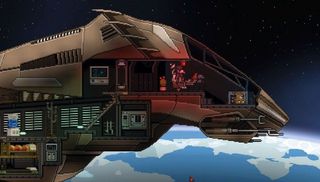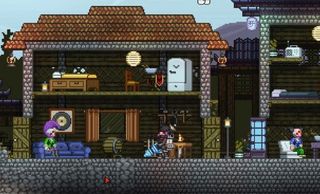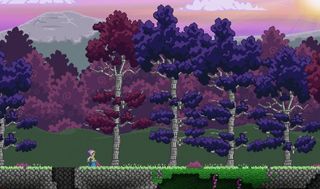How Starbound plans to break down the lines between player and game designer

Chucklefish have been busy. Over the last couple of months, Starbound's developers have announced sweeping changes to the game that made their name, and begun the process of relocating the majority of their international team to a new headquarters in London. The phrase 'bedroom coder' doesn't quite apply to developers who have already scaled the heights of the Steam charts, but the change the team is undergoing is similar to the process that took place in the UK in the 1980s, as larger studios formed around games that started life as passion projects.
Starbound's early access success has given Chucklefish the opportunity to become a small publisher in their own right. They've been working with select indies to help bring their games to an audience, and they're currently hiring a second development team to work on a new game—a topdown pirate RPG influenced by The Legend of Zelda.
“I don't think we want to become a big company,” says Starbound lead designer Tiyuri. “Despite the fact that we work with other companies to get their games out, everybody in the company right now wants to participate in those projects in some fashion. I don't want to lose that—I don't want to lose the idea that we're small enough for the talent we have to take part in everything we do.”
The Starbound community has benefited from this sense of focus already, but they also stand to gain from Chucklefish's evolution into a studio proper. “We've done OK working remotely, but it's certainly not the best way to do things,” Tiyuri says. “I'll be honest – it's probably been our most problematic challenge. Everything takes twice as long. It's going to be so much more efficient being in the same room, and I think it's going to help us creatively as well.”

This is a time of significant change for Starbound. In its present version, the 2D game challenges players with survival on procedurally-generated planets within a massive randomised galaxy. You mine for minerals, construct shelters and craft your way up through tiers of gear—much like Minecraft or, particularly, Terraria. Where it differentiates itself is in the scale of its randomisation and in the effort being made to give each world a sense of life and history. Planets may have settlements with NPCs, dungeons, or bases full of enemies. Each of these affects the type of experience players will have, and their presence complements Chucklefish's goal to guide the player through Starbound with quests, stories and choice as well as the pursuit of the next level of gear.
It's this goal that is informing the next stage in Starbound's life. The game is in a position now where sweeping changes can be made to content without requiring substantial changes to the underlying engine. “What has taken so long in developing Starbound is the technology, not the content,” Tiyuri says. “We're now at a stage where almost all of it is done and we can throw ourselves into the content—and that just doesn't take as long. It's a lot faster, and a lot more fun.”
He goes on: “the more content in the game the better the experience becomes. We set out to build our engine and our toolset so that you're able to add new content to almost any part of the game without any programming knowledge whatsoever. Our artists aren't simply drawing pictures – they're adding new guns, weapons, monsters, all sorts of things. This frees our programmers up to work on bug fixes and engine features.”
The biggest gaming news, reviews and hardware deals
Keep up to date with the most important stories and the best deals, as picked by the PC Gamer team.
“It's a very fluid environment,” Rhopunzel, one of Starbound's artists, tells me. “There's no set thing a person does – as things to do come in, people just do them.”

The structure of the game that surrounds this content is going to change substantially. Instead of progressing through space sectors of escalating difficulty, the bulk of the game will take place within a single sector. Players will be asked to acquire an amount of pixels (Starbound's currency) to open up new places to explore, but unlike the current game you'll be free to acquire pixels however you like. This, then, is the hook for Chucklefish to add lots of new things to do—from building a homestead and farming to running missions for NPCs based on outpost worlds. If you'd like to keep digging and dungeon-running, you can, but the developers won't be required to stick to that pattern while designing new stuff to do.
What Chucklefish are capable of building, however, will always be exceeded – at least in number – by what the community can produce. Starbound already has an active modding scene on account of its flexible engine, and in some cases mods have been folded into the official game. I asked Tiyuri if having modders alter the game in its alpha state would affect Starbound's direction as a whole.
“We have an idea of what fits the game in its base form,” he says in response. “A tone to the content. A lot of what modders produce gels very well with our current ideas, but whenever we find a mod and include it in the base game we make sure to tell that modder that we don't want to stifle their creativity. We don't want them to just work to our specifications. We don't want to lead anyone – we like the creativity, and it's good that not all of the mods out there conform to what we want Starbound to be.”
Instead of overtaking the main game, then, Chucklefish see modding as a valuable counterpoint to their own work. “I really like working with modders,” says programmer Bartwe. “They expand the possibilities—they're doing all kinds of things we can't or didn't think to do.”
Joining in 2011, Chris made his start with PC Gamer turning beautiful trees into magazines, first as a writer and later as deputy editor. Once PCG's reluctant MMO champion , his discovery of Dota 2 in 2012 led him to much darker, stranger places. In 2015, Chris became the editor of PC Gamer Pro, overseeing our online coverage of competitive gaming and esports. He left in 2017, and can be now found making games and recording the Crate & Crowbar podcast.
Most Popular
